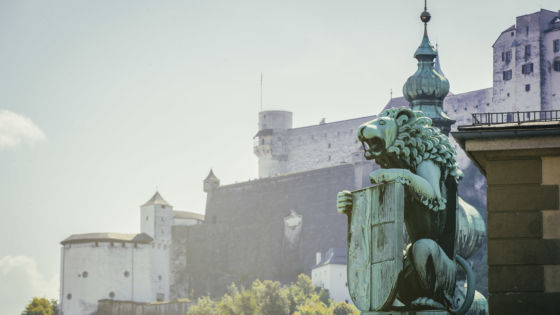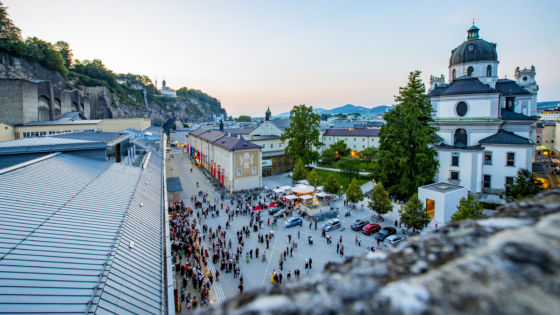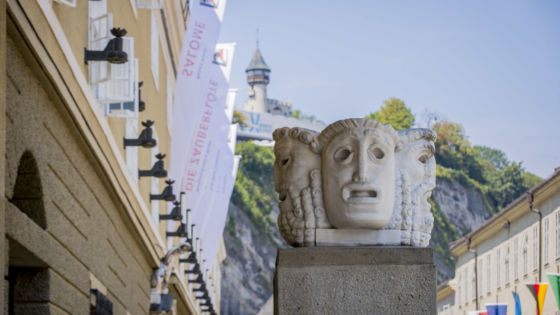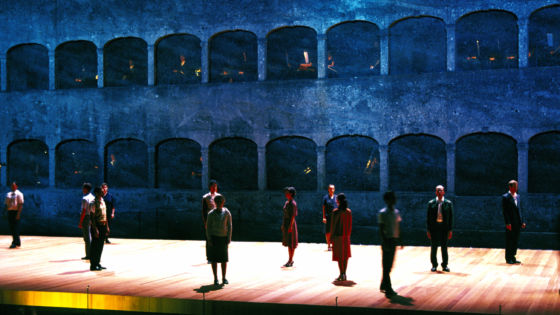Your Support
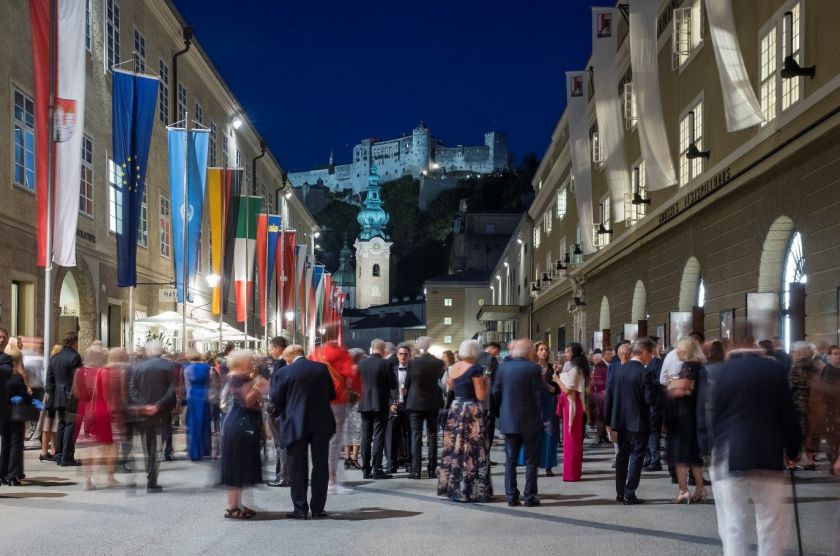
Support Us
News
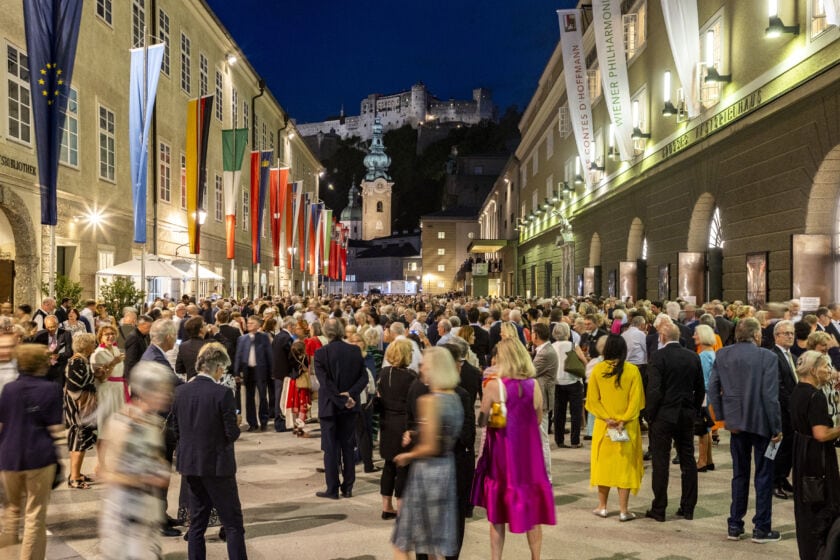
The Salzburg Festival thanks for the support 2025
Great thanks are due to all supporters of the Salzburg Festival. Without the active engagement of its sponsors and private patrons, it would be impossible to present the Salzburg Festival in this form.
MAIN SPONSORS
The financial contributions of the main sponsors benefit the entire Festival programme and are essential in enabling it to present such a rich variety of programming.
AUDI
The AUDI AG has been a main sponsor of the Salzburg Festival since 1995. With a fleet of vehicles, the brand with the distinctive four rings offers an exclusive shuttle service during the Festival, available for bookings by private persons and corporate clients.
For more than 60 years, the car manufacturer from Ingolstadt has actively supported culture. The cultural programme Audi ArtExperience supports and fosters creative dialogue and cultural diversity through Audi’s own initiatives, such as the Audi Young Persons’ Choral Academy and the Audi Summer Concerts, but also sponsors renowned and high-carat cultural institutions – always at the highest level.
SIEMENS
The partnership with Siemens began in 1995, when Siemens became a project sponsor; it expanded to become a main sponsor at the highest level in 1999. Thanks to Siemens, in collaboration with ORF Salzburg and UNITEL, the Festival has been able to offer an extraordinary cultural highlight: the Siemens>Festival>Nights. For more than 20 years, the world’s largest public screening event of classical music in the world has used daylight-compatible technology on an LED screen as well as a state-of-the-art sound system to win over art lovers from around the world.
Every year, visitors enjoy screenings of historic and current Festival performances in the highest quality before the picturesque backdrop of Salzburg’s historical city centre, free of charge. This unique cultural offering is complemented by the Siemens>Breakfast>Concerts every Saturday, while children can enjoy age-appropriate opera screenings every Friday at the Siemens>Children’s>Programme. Thus, Siemens enriches Salzburg’s cultural life and sustainably supports access to music for all generations.
KÜHNE FOUNDATION
The Kühne Foundation has been a main sponsor of the Salzburg Festival since 2019. Its main fields of interest are classical opera and support for young vocalists. Since 2013 the Kühne Foundation has supported the Young Singers Project (YSP). The young talents receive a scholarship and thus the opportunity to present themselves to the public in master classes and perform alongside established artists in opera productions. The final concert of the YSP toward the Festival’s end, which takes place at the Haus für Mozart since 2024, is often an important step to a promising career.
WÜRTH
The Würth Group is the global market leader in the development, production, and sale of assembly and fastening materials, and a long-term partner of the Salzburg Festival. Their collaboration began in 2016; from 2018, the corporation supported the concert series Ouverture spirituelle and later extended its support to include the youth programme jung & jede*r. Starting in the 2025 season, Würth is the Salzburg Festival’s newest main sponsor.
The partnership with the Salzburg Festival emphasizes the cultural activities of the corporation, which have been a fixed part of its corporate culture from the very beginning. Würth fosters a vibrant cultural landscape and social wellbeing. The focus of its philanthropy is on the arts, culture, education, sports and social welfare.
BWT
The BWT Best Water Technology Group is Europe’s leading water technology company and launched its engagement as a main sponsor in 2021. With its water treatment technologies, for which it holds the worldwide patents, BWT supports the Salzburg Festival in its sustainability efforts: staff, artists and guests are provided with refreshing, locally mineralized water – enriched with valuable minerals such as magnesium, zinc and silicate – which has helped avoid the use and transportation of one-way plastic and glass bottles and reduce CO2 emissions. Together with the Salzburg Festival, BWT thereby pursues the goal of making the world better with every sip, and keeping it alive and worth living for future generations – in keeping with the claim: BWT – For You and Planet Blue.
ROLEX
The Salzburg Festival is supported by Rolex, who build upon its existing and ongoing relationship with the Festival as Main Sponsor since 2012 as part of its Perpetual Arts Initiative. For more than half a century, Rolex has partnered some of the world’s most talented artists and leading cultural institutions to promote excellence and the transmission of artistic heritage.
PROJECT SPONSORS
Project Sponsors finance projects which are artistically important but could not be implemented without additional financial help.
UNIQA has been an important partner for the Salzburg Festival since 2004. Conversely, the Festival is a fixed programme of UNIQA’s corporate culture. For many years the focus of this collaboration has been on youth programmes. This enables the Salzburg Festival to steadily expand its efforts in this field. The youth programme jung & jede*r and thus the production of selected children’s operas, youth camps and accompanying events for children and teenagers is made possible thanks to UNIQA’s help.
Raiffeisen Salzburg has been a faithful partner of the Salzburg Festival since 2020. Education, social responsibility, ecology, sports, but also culture are part of the corporate self-concept of the Raiffeisen Banking Group. The idea of enabling the Festival to give the children’s and youth programme jung & jede*r as a gift to young Festival visitors and to extend its reach to schools throughout the state of Salzburg corresponds with Raiffeisen’s values. The partnership between the Salzburg Festival and Raiffeisen beyond 2025 signals a clear commitment to sustainable and long-term collaboration.
The Salzburg AG is deeply rooted in the state and city of Salzburg, and is therefore proud to be a part of “life”. Just as culture is an essential part of Salzburg’s identity, the Salzburg AG is a deeply anchored in the region. Eager to provide cultural support for young people in the city and region, it is glad to be a partner of jung & jede*r, the Salzburg Festival’s youth programme. As an innovative, digital and sustainable company, the Salzburg AG does everything to improve the quality of life of Salzburg’s citizens and to design climate-friendly energy for the future.
The Kia-Ora Foundation supports special projects including artists from New Zealand, Australia and South Africa through its scholarships. In 2025, the semi-staged performance of the opera Mitridate, re di Ponto was supported by the Kia-Ora Foundation.
The Ryuji Ueno Foundation is dedicated to promoting excellence in classical music. In 2025, the foundation supported the Mozart Matinee conducted by Kyohei Sorita.
acm (austrian capital management GmbH) supports the repositioning of the Salzburg Festival’s Archive, which reopened in early 2024 in its new location at the Riedenburg. At the core of this financial support is the digitalization of numerous documents, which can now be made available to a broad public thanks to new technology.
PRODUCT SPONSORS
The Salzburg Festival thanks its Product Sponsors, who donate high-quality materials, thereby contributing essentially to the “total work of art” that is the Festival.
Since 2014, Schlumberger has created a special Festival cuvée for the Salzburg Festival. Furthermore, since 2024, the Festival’s visitors can enjoy products of the renowned house of champagne Moët & Chandon and French rosé wine by Miraval.
The Salzburg Festival is particularly proud to have a regional product partner: Salzburg’s Stiegl Brewery donates its very popular Festival pilsener, and since 2024 also a Festival edition of its “Wildshut Bio Perlage”.
Since 2023, Saint Charles Organics GmbH and Werner und Mertz Professional have supported the Festival with high-quality products.
In addition, since 2024, the Festival is grateful to have the support of Peek & Cloppenburg Austria as an exclusive product partner for Jedermann.
ASSOCIATION OF FRIENDS and PRIVATE DONORS
The Austrian Association of Friends of the Salzburg Festival (Verein der Freunde der Salzburger Festspiele), the German Freunde der Salzburger Festspiele e.V. Bad Reichenhall, the American Salzburg Festival Society, the Swiss Schweizer Freunde der Salzburger Festspiele and Les Amis Français du Festival de Salzbourg in France, with their approximately 6,600 members from 60 countries, have become one of the Festival’s main financial pillars. In addition to annual programming contributions, the Associations underwrite most of the international Festival programme presentations and for example the initiative “Festival Ticket = Bus Ticket”, an important measure to reduce individual traffic in the city, as well as the Festival Opening Party. Furthermore, the Association regularly conducts fundraising campaigns for construction and purchasing projects of the Salzburg Festival.
The Salzburg Festival thanks all the Associations of Friends for their generous financial and also idealistic support.
Special thanks are due to the members of the Golden Club and Silver Club from all over the world, as well as the Festival’s many private donors.
Chief among them is Dr. Hans-Peter Wild, one of those people whose love for the arts and for the city of Salzburg have led them to become a great supporter and patron of the Salzburg Festival. His donation is the largest individual gift by a private patron in the Festival’s history. The Festival owes its Festival Centre to this visionary, a building being created as a new space for encounters between all music lovers and Festival friends. Construction began in the autumn of 2024.
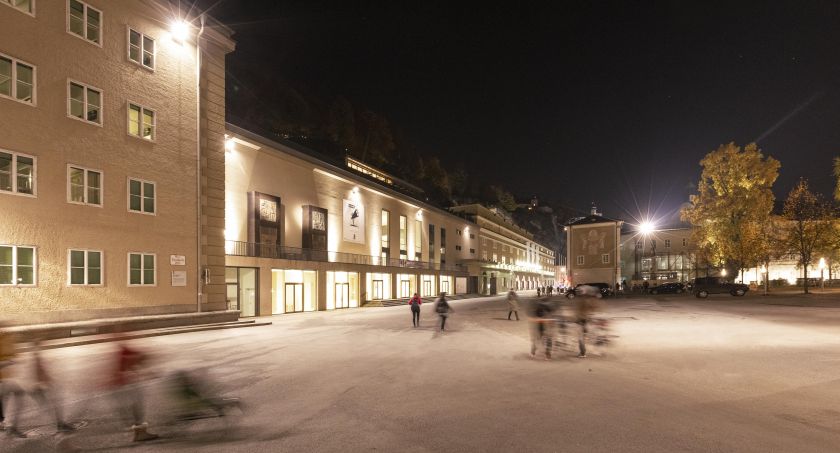
The Salzburg Festival thanks for the support 2024
Great thanks are due to all supporters of the Salzburg Festival. Without the active engagement of the sponsors and private patrons, it would be impossible to present the Salzburg Festival in this form.
MAIN SPONSORS
The financial contributions of the main sponsors benefit the entire Festival programme and are essential in enabling it to present such a rich variety of programming.
AUDI
Audi has been a main sponsor of the Salzburg Festival since 1995. With its electric-only fleet of vehicles, available during the Festival for bookings by private persons and corporate clients, the Audi AG supports the Festival with an exclusive and eco-friendly shuttle service. The automobile company from Ingolstadt has been active in sponsoring culture for more than 60 years. The cultural programme Audi ArtExperience supports creative exchange and promotes cultural diversity at the highest level through its own formats, such as the Audi Summer Concerts, and by sponsoring high-carat cultural institutions. The long-standing partnership between Audi and the Salzburg Festival has been extended through 2027.
SIEMENS
The partnership with Siemens began in 1995, when Siemens became a project sponsor; its contract expanded to become a main sponsor in 1999. Thanks to Siemens (in collaboration with ORF Salzburg and UNITEL), the Festival has been able to offer the Siemens>Festival>Nights, the world’s largest public screening event of classical music in the world, for more than 20 years, using daylight-compatible technology on an LED screen as well as a state-of-the-art sound system. Every year, thousands of art lovers enjoy screenings of historic and current Festival performances before the picturesque backdrop of Salzburg’s historical city centre, free of charge. In addition, the Siemens>Breakfast>Concerts are presented every Saturday, while children can enjoy age-appropriate opera screenings every Friday at the Siemens>Children’s>Programme.
KÜHNE FOUNDATION
The Kühne Foundation has been a main sponsor of the Salzburg Festival since 2019. Its main fields of interest are classical opera and support for young vocalists. The current contract with the Kühne Foundation runs through 2027. Since 2013, for eleven years now, the Kühne Foundation has supported the Young Singers Project (YSP), to which 16 participants from ten nations were invited this year. The young talents receive a scholarship and thus the opportunity to present themselves to the public in master classes and perform alongside established artists in opera productions. The final concert of the YSP toward the Festival’s end, presented for the first time at the Haus für Mozart this summer, is often an important step to a promising career.
ROLEX
For more than half a century, Rolex has partnered some of the world’s most talented artists and leading cultural institutions to celebrate excellence and contribute to perpetuating artistic heritage. Through the Rolex Perpetual Arts Initiative, a broad portfolio of arts that extends through architecture, cinema, dance, literature, music, theatre and visual arts, the company confirms its long-term commitment to global culture. In all these endeavours, Rolex supports artistic excellence and the transmission of knowledge to future generations, who in turn pass on the world’s cultural legacy. Among its Testimonees in music are world-leading artists such as Cecilia Bartoli, Benjamin Bernheim, Gustavo Dudamel, Juan Diego Flórez, Jonas Kaufmann, Rolando Villazón, Sonya Yoncheva and Yannick Nézet-Séguin. In 2012, Rolex became Main Sponsor of the Salzburg Festival and Exclusive Sponsor of the Salzburg Whitsun Festival. Furthermore, since 2021 Rolex has supported the Herbert von Karajan Young Conductors Award.
BWT
The BWT Best Water Technology Group is Europe’s leading water technology corporation and launched its engagement as a main sponsor of the Salzburg Festival in 2021. With its water treatment technologies, for which it holds the worldwide patents, BWT supports the Salzburg Festival in its sustainability efforts: employees, artists and guests are treated to refreshing, local, mineralized BWT water – enriched with valuable minerals such as magnesium, zinc and silicate – and has helped avoid the production and transport of one-way plastic and glass bottles, thereby also reducing CO2 emissions. Together with the Salzburg Festival, BWT thus pursues the goal of improving the world sip by sip, and maintaining it for future generations– in keeping with BWT’s claim: BWR – For You and Planet Blue.
PROJECT SPONSORS
Project Sponsors finance projects which are artistically important but could not be implemented without additional financial help.
UNIQA has been an important partner for the Salzburg Festival since 2004. Conversely, the Festival is a fixed programme of UNIQA’s corporate culture. For many years the focus of this collaboration has been on youth programmes. This enables the Salzburg Festival to steadily expand its efforts in this field. The youth programme jung & jede*r and thus the production of selected children’s operas, youth camps and accompanying events for children and teenagers is made possible thanks to UNIQA’s help.
Raiffeisen Salzburg has been a partner of the Salzburg Festival since 2020. Education, social responsibility, ecology, sports, but also culture are part of the corporate self-concept of the Raiffeisen Banking Group. The idea of enabling the Festival to give the children’s and youth programme jung & jede*r as a gift to young Festival visitors and to extend its reach to schools throughout the State of Salzburg met with open ears at Raiffeisen. The partnership between the Salzburg Festival and Raiffeisen is designed for many years.
At the initiative of Prof. Dr. h.c. mult. Reinhold Würth, the Würth Group became the third sponsor of the children’s and youth programme jung & jede*r in 2022. The Würth Group and the Würth Foundation support a living cultural landscape and social wellbeing in many locations – to Reinhold Würth, the arts and culture are a strong link between different social areas.
The Kia-Ora Foundation supports special projects including artists from New Zealand, Australia and South Africa through its scholarships.
acm (austrian capital management GmbH) supports the repositioning of the Salzburg Festival’s archive, which was reopened in February 2024 in its new location at the Riedenburg. At the core of this support is the digitalization of numerous documents, which can now be made available to a broad public thanks to new technology.
ASSOCIATION OF FRIENDS and PRIVATE DONORS
The Association of Friends of the Salzburg Festival with its approximately 6,600 members from 60 countries has become one of the Festival’s main financial pillars. The Association contributes almost as much to the Festival budget as the City, State and Salzburg Tourism Board, who are responsible for deficit financing. In addition to an annual programming contribution, the Association underwrites most of the international Festival programme presentations and for example the initiative Festival Ticket = Bus Ticket, an important measure to reduce individual traffic in the city. Furthermore, the Association regularly conducts fundraising campaigns for construction and purchasing projects of the Salzburg Festival.
The Salzburg Festival also thanks the international Associations of Friends in Germany, the USA, Switzerland and France for their financial and idealistic support.
Special thanks are due to the members of the Golden Club and Silver Club from all over the world.
In addition, we wish to thank the Festival’s many private donors. First and foremost, these include Professor Dr. h.c. mult. Reinhold Würth, to whom the city of Salzburg already owes a debt of gratitude for his contributions to the visual arts. He and the Würth Group are also among the great patrons of the Salzburg Festival. It is only thanks to his generosity that the Ouverture spirituelle can offer such artistic riches.
Dr. Hans-Peter Wild is one of those people whose love for the arts and for the beauty of the city of Salzburg have led them to become a great supporter and patron of the Salzburg Festival. His donation is the largest individual gift from a private patron. The Festival owes its Festival Centre to this visionary, a building being created as a new space for encounters between all music lovers and Festival friends. Construction begins in the autumn of 2024.
PRODUCT SPONSORS
The Salzburg Festival thanks its Product Sponsors, who donate high-quality materials, thereby contributing essentially to the “total work of art” that is the Festival.
Since 2014, Schlumberger has enhanced the Festival with a Festival Cuvée especially created for the occasion. In addition, since 2024 Festival visitors benefit from an exclusive partnership with the renowned champagne maker Moët & Chandon and can enjoy the French rosé wine produced by Miraval.
The Salzburg Festival is pleased to have a local partner, Salzburg’s Stiegl Brewery, donating its very popular Festival pilsener, and for the first time this year its Wildshut Perlage.
Since 2023, Saint Charles Organics GmbH and Werner und Mertz Professional have supported the Festival with high-quality products.
In addition, the Festival is grateful to have found a new product partner for Jedermann in Peek & Cloppenburg Austria.
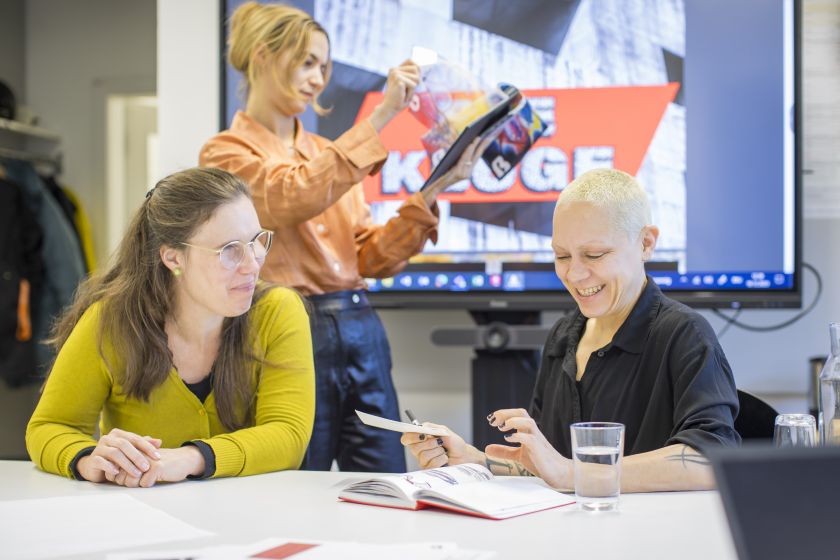
“We want to build a bridge for those children who are not from culturally conversant families as well.”
“Oh, if only I had believed my daughter!” laments the father. After all, she had warned him about the king’s suspiciousness. When her father discovers a valuable object, the king accuses him of keeping a part of it for himself. The father is promptly thrown in prison. Hearing his cries of woe, the king summons the man’s daughter. He poses three riddles, which she solves without difficulty. Impressed by her cleverness, he takes her as his wife. But when she exposes another error of judgement by the king, he casts her out and allows her to take only “what her heart holds most dear” with her… Nine performers and an orchestra of 15 musicians will explore pressing questions of justice and injustice, power and powerlessness for a young audience.
Die Kluge is the third opera for children produced by Ursula Gessat, education manager of the Salzburg Festival since 2021, at artistic director Markus Hinterhäuser’s behest. Wilfried Hiller and Paul Leonard Schäffer created a new, reduced musical version of Carl Orff’s opera in 2019 for a smaller orchestra, and this new production is based on this. Armela Madreiter adapted the libretto, which the composer Carl Orff wrote based on the Brothers Grimm’s fairy-tale The Peasant’s Wise Daughter. After the productions WUT, Ping Pong and Fiesta, this is the fourth time she is collaborating on the Salzburg Festival’s youth programme.
On 26 July, the new production of Die Kluge premieres at the Schauspielhaus Salzburg; nine further performances follow through 25 August. Giulia Giammona directs; the German conductor Anna Handler conducts. The roles will be embodied by participants of the Young Singers Project. Introductory workshops entitled Let’s Play Opera precede the performances.
The Drama Camp allows theatre-loving teenagers aged 14 to 19 to delve into a work and the themes of one of the Salzburg Festival’s drama productions, spending a week in daily workshops and rehearsals on a rehearsal stage and delving into the topics of the drama production Sternstunden der Menschheit.
The popular School Programme and the mobile productions entitled From Abtenau to Zell am See will feature the musical theatre work Zeitzone JETZT and the drama for children Liebe Grüße … oder Wohin das Leben fällt. In this way, students experience music and theatre directly. Both pieces are about topics such as friendship, love, care and loss. In the summer, both productions will be performed at the Schauspielhaus.
Opera Camps will focus on Capriccio, Der Idiot and Les Contes d’Hoffmann. Children and teenagers aged 9 to 17 will spend a week staying at Arenberg Castle with full board and accommodation, playing and singing and delving into the world of opera, and ultimately presenting their own new interpretation, developed with members of the Vienna Philharmonic and pedagogues.
The Festival Mentorships already proved a success last year and continues: experienced Festival visitors take on a mentorship for young adults aged 16 to 26 who have never attended a Salzburg Festival performance.
6,000 youth tickets for young people to opera, drama and concert performances are available with discounts of up to 90 percent for teenagers and young adults under 27. Youth tickets to the Salzburg Whitsun Festival will go on sale in the spring via the Ticket Gretchen App: discounted tickets for the summer Festival will be available at the end of May, those for the Whitsun Festival at the end of April.
https://www.salzburgerfestspiele.at/en/jung-jeder/u27
“Young Friends” of the Salzburg Festival have access to the comprehensive summer programme of the Friends of the Salzburg Festival and receive preferential treatment when ordering youth tickets. Register at https://www.festspielfreunde.at/EN/.
From 26 July, the Siemens>Children’s>Programme is tailored to the youngest visitors: every Friday at 10 am on Kapitelplatz. Admission is free.
As the largest art insurance in Central Europe, art and culture are an essential part of UNIQA’s corporate culture. UNIQA has been an important partner for the Salzburg Festival since 2004; for many years, the focus of this collaboration has been on youth programmes. This enables the Salzburg Festival to steadily expand its efforts in this field. The youth programme jung & jede*r and thus the production of selected children’s operas, youth camps and accompanying events for children and teenagers is made possible thanks to UNIQA’s help. This enables the festival to reach a young audience, awakening the joy of music and keeping it alive for the future.
Würth Group
At the initiative of Prof. Dr. h.c. mult. Reinhold Würth, the Würth Group became the third sponsor of the children’s and youth programme jung & jede*r in 2022. The Würth Group and the Würth Foundation support a living cultural landscape and social wellbeing in many locations – to Reinhold Würth, the arts and culture are a strong link between different social areas.
Raiffeisen Salzburg
Raiffeisen Salzburg has been a partner of the Salzburg Festival since 2020. Education, social responsibility, ecology, sports, but also culture are part of the corporate self-concept of the Raiffeisen Banking Group. The idea of enabling the Festival to give the children’s and youth programme jung & jede*r as a gift to young Festival visitors and to extend its reach to schools throughout the State of Salzburg met with open ears at Raiffeisen. The partnership between the Salzburg Festival and Raiffeisen is designed for many years.

The Salzburg Festival thanks for the support 2023
SPONSORS AND PATRONS
Great thanks are due to all supporters of the Salzburg Festival. Without the active engagement of the sponsors and private patrons, it would be impossible to present the Salzburg Festival in this form.
MAIN SPONSORS
The financial contributions of the main sponsors benefit the entire Festival programme and are essential in enabling it to present such a rich variety of programming.
AUDI
Audi has been a main sponsor of the Salzburg Festival since 1995; ever since, the automobile producer and the Salzburg Festival have enjoyed a reliable partnership, which in 2022 was extended for another five years, through 2027. With its electric-only fleet of vehicles, available during the Festival for bookings by private persons and corporate clients, the Audi AG supports the Festival with an exclusive and eco-friendly shuttle service. In 2021, Audi invited Festival visitors to take an eventful city tour of Salzburg: they were able to experience highlights of the Festival’s history by means of a virtual-reality headset in an Audi e-tron. The only guest performance of the Salzburg Festival takes place at the Audi Summer Concerts in Ingolstadt.
SIEMENS
The partnership with Siemens began in 1995, when Siemens became a project sponsor; it expanded to become a main sponsor in 1999. The long-standing contract has been extended through 2026. Thanks to Siemens (in collaboration with ORF Salzburg and UNITEL), the Festival has been able to offer the Siemens>Festival>Nights, the world’s largest public screening event of classical music in the world, for 21 years, using daylight-compatible technology on an LED screen as well as a state-of-the-art sound system. Every year, thousands of art lovers enjoy screenings of historic and current Festival performances before the picturesque backdrop of Salzburg’s historical city centre, free of charge. In addition, the Siemens>Breakfast>Concerts are presented every Saturday, while children can enjoy age-appropriate opera screenings every Friday at the Siemens>Children’s>Programme.
KÜHNE FOUNDATION
The Kühne Foundation has been a main sponsor of the Salzburg Festival since 2019. Its main fields of interest are classical opera and support for young vocalists. The current contract with the Kühne Foundation runs through 2024.
Since 2013, for ten years now, the Kühne Foundation has supported the Young Singers Project (YSP). This year, 14 participants from nine nations were invited. The young talents receive a scholarship and thus the opportunity to present themselves to the public in master classes and perform alongside established artists in opera productions. The final concert of the YSP toward the Festival’s end is often an important step to a promising career.
ROLEX
For more than half a century, Rolex has partnered some of the world’s most talented artists and leading cultural institutions to help perpetuate artistic heritage. Through the Rolex Perpetual Arts Initiative, a broad portfolio of arts that extends through music, architecture, cinema and the Rolex mentoring programme, the brand confirms its long-term commitment to global culture. In all of these endeavours, Rolex supports artistic excellence and is helping to pass knowledge to future generations, making a lasting contribution to culture worldwide. Among its Testimonees in music are world-leading artists such as Cecilia Bartoli, Benjamin Bernheim, Gustavo Dudamel, Juan Diego Flórez, Jonas Kaufmann, Rolando Villazón and Sonya Yoncheva. In 2012, Rolex became Main Sponsor of the Salzburg Festival and Exclusive Sponsor of the Salzburg Whitsun Festival. Furthermore, since 2021 Rolex has supported the Herbert von Karajan Young Conductors Award.
BWT
The BWT “Best Water Technology” Group launched its engagement as a main sponsor in 2021. With its water treatment technologies, for which it holds the worldwide patents, BWT supports the Salzburg Festival in its sustainability efforts and has helped avoid the use of one-way plastic and glass bottles in all Festival venues. Employees, artists and guests are treated to local, mineralized BWT water, contributing to the sparing use of our worldwide resources with every sip – in keeping with BWT’s vision: “Change the world – sip by sip”.
PROJECT SPONSORS
Project Sponsors finance projects which are artistically important but could not be implemented without additional financial help.
UNIQA has been an important partner for the Salzburg Festival since 2004. Conversely, the Festival is a fixed programme of UNIQA’s corporate culture. For many years the focus of this collaboration has been on youth programmes. This enables the Salzburg Festival to steadily expand its efforts in this field. The youth programme jung & jede*r and thus the production of selected children’s operas, youth camps and accompanying events for children and teenagers is made possible thanks to UNIQA’s help.
Raiffeisen Salzburg has been a partner of the Salzburg Festival since 2020. Education, social responsibility, ecology, sports, but also culture are part of the corporate self-concept of the Raiffeisen Banking Group. The idea of enabling the Festival to give the children’s and youth programme jung & jede*r as a gift to young Festival visitors and to extend its reach to schools throughout the State of Salzburg met with open ears at Raiffeisen. The partnership between the Salzburg Festival and Raiffeisen is designed for many years.
At the initiative of Prof. Dr. h.c. mult. Reinhold Würth, the Würth Group became the third sponsor of the children’s and youth programme jung & jede*r in 2022. The Würth Group and the Würth Foundation support a living cultural landscape and social wellbeing in many locations – to Reinhold Würth, the arts and culture are a strong link between different social areas.
The Kia-Ora Foundation supports special projects including artists from New Zealand, Australia and South Africa through its scholarships. In 2023, the concert performance of the opera I Capuleti e I Montecchi was supported by the Kia-Ora Foundation.
acm (austrian capital management GmbH) supports since this year the repositioning of the Salzburg Festival’s archive, which will reopen in the autumn of 2023 in a new location. At the core of this support is the digitalization of numerous documents, which can now be made available to a broad public thanks to new technology.
ASSOCIATION OF FRIENDS and PRIVATE DONORS
The Association of Friends of the Salzburg Festival with its approximately 6,600 members from 60 countries has become one of the Festival’s main financial pillars. The Association contributes almost as much to the Festival budget as the City, State and Salzburg Tourism Board, who are responsible for deficit financing. In addition to an annual programming contribution, the Association underwrites most of the international Festival programme presentations and for example the initiative Festival Ticket = Bus Ticket, an important measure to reduce individual traffic in the city. Furthermore, the Association regularly conducts fundraising campaigns for construction and purchasing projects of the Salzburg Festival.The Salzburg Festival also thanks the international Associations of Friends in Germany, the USA, Switzerland and France for their financial and idealistic support.
Special thanks are due to the members of the Golden Club and Silver Club from all over the world.
In addition, we wish to thank the Festival’s many private donors. First and foremost, these include Professor Dr. h.c. mult. Reinhold Würth, to whom the city of Salzburg already owes a debt of gratitude for his contributions to the visual arts. He and the Würth Group are also among the great patrons of the Salzburg Festival. It is only thanks to his generosity that the Ouverture spirituelle can offer such artistic riches.
Another great idealistic and financial sponsor and patron of the Salzburg Festival is Dr. Wolfgang Porsche. After financing a new audience grandstand for Jedermann, he is now helping the Festival meet future challenges in the field of digitalization.
Dr. Hans-Peter Wild is one of those people whose love for the arts and for the beauty of our city of Salzburg have led them to become a great supporter and patron of the Salzburg Festival. The Festival owes its Festival Centre to this visionary, a building being created as a new space for encounters between all music lovers and Festival friends.
PRODUCT SPONSORS
The Salzburg Festival thanks its Product Sponsors, who donate high-quality materials, thereby contributing essentially to the “total work of art” that is the Festival. The following four shall be mentioned here:
Since 2014, Schlumberger and Champagne Louis Roederer have supported the Festival by creating a special Festival cuvée and supplying their champagne.
The Salzburg Festival is also delighted to have a local partner, Salzburg’s Stiegl Brewery, donating its very popular Festival pilsener.
In addition, we are happy to have found a new product sponsor in 2023: Saint Charles.
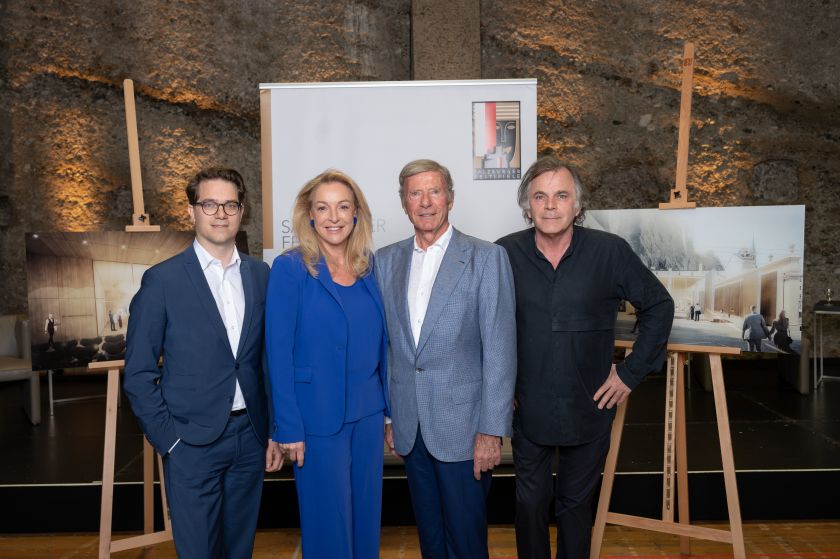
The Festival Centre Becomes Reality Dr. Hans-Peter Wild Enables the Construction of a Glass Pavilion and Event Location on Herbert-von-Karajan-Platz
“Thanks to the largest donation from a private patron in the history of the Salzburg Festival, we will create a new and vibrant space for encounters amidst the historical heart of our city. A place where a transparent pavilion allows insights into the Festival’s inner workings throughout the year, and where daily life and a space for the arts forge an entirely natural alliance,” says Festival President Kristina Hammer.
A Message from Dr. Hans-Peter Wild:
Launching the new Festival Centre
It is a great honour for me to give the signal launching the construction of the new Festival Centre today! I look forward to supporting this project over the coming three years with up to 12 million Euros, for I have felt a strong connection with Salzburg since the days of my youth.
My parents attended the Festival regularly and often took me along to Salzburg. To this day, I try to visit the Festival every year. In the meantime, as you may know, I have also purchased the two hotels Schloss Mönchstein and Goldener Hirsch in Salzburg, so my relationship with this city has become even closer.
The major project “Festival District 2030” was born as part of the celebrations marking the Salzburg Festival’s centenary. The fact that today’s ceremony marks the launch for building the Festival Centre grew from many conversations with Kristina Hammer and her team, and is surely a milestone for the City of Salzburg as well.
The redesign and expansion of the entire Festival District moves the Festival into its second century, preparing and equipping it for future challenges.
The high esteem which the arts are held in here in Salzburg can be preserved and even extended by this monumental undertaking. I am convinced that it will contribute to the longterm attractiveness of this city. The beautiful space around the historical Horse-Well will receive an upgrade, and guests from Austria and abroad will be able to access it in its original form.
To me, supporting the arts is very important. Unlike business, they cannot pursue only efficiency and profit. Rather, their role is to raise enthusiasm and offer inspiration through creativity and emotions. The arts need free space – in reality and mentally – to unfold their full potential. The new Festival Centre aims to contribute to this. It is intended as a place of encounters and exchange.
I am delighted that the Centre will be open year-round in the future, and it is my wish that it can be used for meetings and events outside of the Festival season, throughout the year. This is one of the potential uses of the hall envisioned for its basement floor. I wish all those involved the greatest success in implementing the new Festival Centre.
“Approaching the Festival Centre, the massive entrance gates are visible from afar, shimmering in brass hues, marking the transition into the world of the ‘Salzburg Festival’ like pillars. Visitors enter the new ‘Festival room’, which presents as an abstract composition of individual sculptural elements, flanked by ‘wall panelling’ reminiscent of a living room and complemented by the reopened gate in the back wall. In its midst, a glass pavilion welcomes not only visitors to the Salzburg Festival, but all those traversing the beautiful historical city centre of Salzburg in search of discoveries,” says Stefan Marte of Marte.Marte Architects.
The History of the Herbert von Karajan-Platz
From Vision to Implementation of the Festival Centre
In 1640, invalids sought help at the hospital on Spitalplatz; later, scholars crossed Studentenplatz, heading for the university of the Benedictines; then farmers weighed their harvest on Heuwaagplatz, until the square was renamed Siegmundsplatz, in honour of PrinceArchbishop Sigismund III. Since 1991, the citizens of Salzburg have known it as Herbert von Karajan-Platz.
Directly adjacent to the Festspielhaus and Felsenreitschule, during the Festival weeks, thousands of arts lovers from all over the world congregate here – for the rest of the year, however, little is felt of these jostling crowds.
One reason is that outside its own events, the Salzburg Festival has never had a place which would invite visitors to pass the time, enabling intense exchange.
Therefore, it has long been a cherished goal of the Salzburg Festival to turn this once socentral square immediately outside our performance venues into a vibrant meeting point available year-round to all the inhabitants and visitors to our city, by building a new Festival Centre.
On the occasion of its centenary, the Salzburg Festival therefore initiated an international competition to implement such a building. The winning design, chosen by the jury and created by Marte.Marte Architects, was presented to the public by Helga Rabl-Stadler, the Festival’s President at the time, in early 2020, shortly before the pandemic struck. It foresaw “revolving gates with a brass shimmer” leading into the inner courtyard between the Pferdeschwemme (Horse-Well) and the Schüttkasten, where “a rectangular glass pavilion” would house a modern information centre, while a café open to the street on summer days would create a lowthreshold interface between daily life and high culture.
These plans met with great enthusiasm. However, even at the time it was clear that a new Festival Centre would never be able to be financed from the existing budget. “It is my greatest goal to finance this building through private funding. After all, we urgently need our public funding for the imminent general overhaul of our Festival theatres,” Rabl-Stadler explained.
In early 2020, it did not seem unrealistic to hope that the centenary celebrations might encourage sufficient patrons of the arts to enable such a “great gift to all the Festival’s visitors”.
Therefore, project planning was tackled, with substantial support – not only of the financial kind – from the Association of Friends and Supporters of the Festival, and Marte.Marte Architects, the team of Executive Director Lukas Crepaz and the Project Manager Michael Brandauer worked assiduously to obtain a building permit. Even during the pandemic, after the consent of the Federal Landmark Commission and the Expert Commission on the Preservation of the Historical City Centre had been secured, the Building Authority granted the building permit in the autumn of 2020.
However, the pandemic and its attendant insecurities dampened the ambitious financing goals of the Salzburg Festival.
In early 2022, Kristina Hammer took over the position of President. With her background in business, where relationships and encounters with customers, guests and audiences are an equally important issue, she was immediately convinced that this project offered a unique chance for the Festival to attain the even broader opening she had envisioned from the start.
“We consider it an opportunity to create a space for encounters with the Festival for all citizens and visitors to this city, a space that is open all year round,” says Hammer. “A place where daily life and space for the arts combine in an entirely natural way, and where we can bring our programmes and values even to those who have not yet been in contact with the Festival.”
On the basis of the existing concept, the Directorate refined the possible usage of the Festival Centre once more. The result is an open suite of spaces with flexible functionality, inviting discovery and equally able to host encounters as well as events, lectures, multimedia presentations, receptions, panel discussions and readings.
With this concept in hand, the President once again went in search of sponsors or donors. And found one who wished to share this vision. On 19 May, Kristina Hammer is able to make this public announcement, on behalf of the Directorate: “We will build this Festival Centre.” At the same time, she presents the man who makes this endeavour possible: Hans-Peter Wild, a Swiss entrepreneur with German roots, has been attending the Festival since his childhood and has long been one of its important donors. Hans-Peter Wild will provide a sum of 12 million Euros in total for the construction of the new Festival Centre – the largest donation from a private patron in the history of the Festival so far.
The Directorate of the Salzburg Festival thanks Dr. Hans-Peter Wild for his generous contribution, which it considers a gift not only to the Festival, but to the city as a whole.
“The arts and culture are fundamental; they are essential for our lives. This essentiality goes far beyond the parameters of daily life. In an unprecedented manner, we are confronted with the phenomenon that proximity can only be created through distance. We need the arts and culture more than ever, more urgently than ever. They are what make human beings human.
With the new Festival Centre, we wish to invite visitors to experience what we have to share all year round. People don’t want to be picked up, they want to be invited, and thanks to Hans-Peter Wild’s generous donation, this place becomes a new space for encounters,” says Artistic Director Markus Hinterhäuser.
“Our heartfelt thanks to Dr. Hans-Peter Wild for making it possible to build the Festival Centre we began planning during our centenary with his extremely generous donation. This will upgrade the entire district, both in terms of function and urban design. Once construction begins after the 2024 Salzburg Festival, this will be a brilliant start for our major project ‘Festival District 2030’,” says Lukas Crepaz, Executive Director of the Salzburg Festival.
The Salzburg Festival thanks all its supporters and sponsors, the Association of Friends and the public authorities for their long-term, continuous funding, enabling both the presentation of the artistic programme and the extraordinary investments of the project Festival District 2030.
Dr. Hans-Peter Wild: Curriculum Vitae
The Swiss entrepreneur Dr. Hans-Peter Wild first studied law at the universities in Munich, Tübingen and Heidelberg, graduating with distinction. He then studied economics at the Mannheim University. Wild completed a doctoral thesis at the law faculty of the Mannheim University on “The Market-Dominant Company under French Law” and was awarded the title Dr. iur. in consequence.
The Entrepreneur
After completing his studies, Dr. Hans-Peter Wild first gathered external experience before joining his father’s company in 1974, when this was essentially manufacturing basic materials and machines as well as machinery for the German beverage industry.
Dr. Wild expanded the business in basic materials by acquiring F&C International in Cincinnati, turning the brand Wild Flavors GmbH, headquartered in Zug, Switzerland, into one of the world’s leading manufacturers of natural flavourings for the food industry. In addition, he expanded the worldwide business with Capri-Sonne. The fruit juice products branded as Capri-Sonne, or Capri-Sun today, have been produced in Eppelheim since 1969, and have a presence in more than 100 countries today under various licensing agreements. Wild owns 100% of the company.
His Family Office in Zug is currently responsible for asset management as well as direct investments in established companies and start-ups, especially in the biotechnology and technology sector. This also includes Tokomak Energy, the first company in the world to generate a plasma temperature of 100 million degrees on 22 February 2022, corresponding to approximately six times the temperature of the sun’s inner core.
Social Responsibility
Dr. Hans-Peter Wild feels responsible not only for his companies, but also to society – both regionally and globally. Therefore, Dr. Wild is the chairman of the charitable foundation Leonie-Wild-Stiftung, which he founded together with his mother in 1997. In June 2006, the city of Eppelheim appointed him an honorary citizen for his achievements as a businessman and his regional social philanthropy.
In gratitude and acknowledgment of the liberation of Germany from the Nazis in 1945, Dr. Wild donated 16 million dollars to the US Marine Corps Scholarship Foundation, enabling about 300 children of Marines to pursue university studies.
Dr. Wild continues to provide significant long-term support for projects at the universities in Heidelberg and Mannheim. He helps both universities attract top scientists, thereby further increasing their international standing. In 1996, Dr. Hans-Peter Wild was named an honorary senator of the Ruprecht Karl University of Heidelberg; in 2021, he was honoured in the same way by the Mannheim University. In Switzerland, Dr. Wild supports mainly medical projects at the Zurich University, as he does at the Johns Hopkins Hospital in the USA.
Dr. Wild also offers support to multiple cultural projects. The spectrum ranges from support for highly talented young musicians to projects with a global effect – such as the construction of the Salzburg Festival Centre.
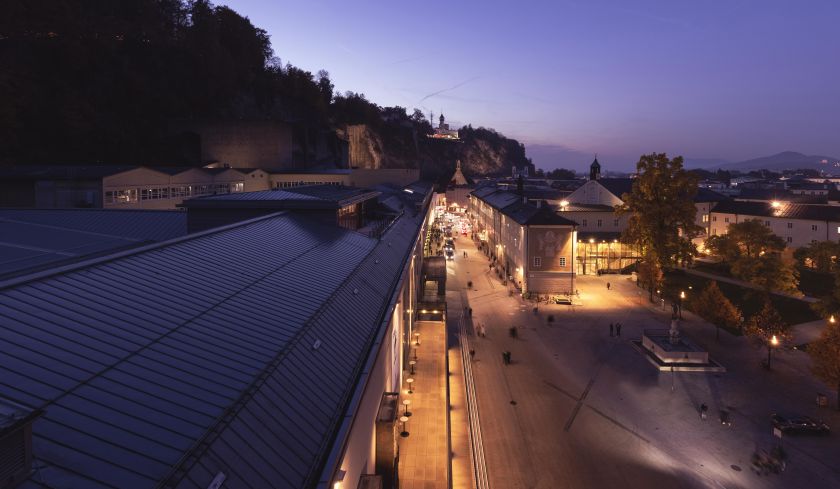
The Salzburg Festival thanks its supporters for 2022
MAIN SPONSORS
AUDI
Audi has been a main sponsor of the Salzburg Festival since 1995. It is particularly the longterm nature of this partnership which is essential for the Festival’s budget planning. On the occasion of two anniversaries, the Festival’s centenary and the 25 year anniversary of the partnership, Audi invited Festival visitors to take an eventful trip in 2021: on a tour of the city they were able to experience highlights of the Festival’s history by means of a virtual-reality headset in an Audi e-tron. The Salzburg Festival is grateful for the fleet of electronic Audi vehicles – our main sponsor thereby contributes to a greener Festival.
SIEMENS
Siemens was a project sponsor of the Festival from 1995 to 1998 and has been a main sponsor since 1999. The contract has been extended through 2024 at least. Thanks to Siemens, the Festival is able to offer a range of performances free of charge that is unique throughout the world. Since 2002, the Siemens>Festival>Nights have been the largest public screening event of classical music in the world. More than one million viewers have enjoyed screenings of Festival performances on Kapitelplatz, free of admission. A dazzling atmosphere and an intriguing programme have made the Siemens Festival>Nights a fixture of the Salzburg Festival summer.
KÜHNE FOUNDATION
The Kühne Foundation has been a main sponsor of the Salzburg Festival since 2019. It thereby substantially expanded this successful partnership. Since 2013 the Kühne Foundation has supported the Young Singers Project (YSP); it is especially interested in supporting talented young vocalists worldwide. Every year, the final concert of the YSP is among the first Salzburg Festival events to sell out. The contract with the Kühne Foundation was extended in 2021 for three additional years, i.e. through 2024.
ROLEX
Rolex’s commitment to the arts dates back to the 1970s when New Zealand soprano Dame Kiri Te Kanawa became the first cultural Testimonee. This commitment has developed to include many other leading artists, prestigious institutions and festivals. Among its brand ambassadors are stars such as Cecilia Bartoli, Jonas Kaufmann, Juan Diego Flórez, Gustavo Dudamel, Sonya Yoncheva and Benjamin Bernheim. In 2012, Rolex became a main sponsor of the Salzburg Festival and exclusive sponsor of the Salzburg Whitsun Festival. This double partnership, which has been extended through 2027, means that the Salzburg Whitsun Festival is able to present an annual new opera production that is then revived during the summer programme. Furthermore, since 2021 Rolex supports the Herbert von Karajan Young Conductors Award.
BWT
BWT launched its engagement as a main sponsor in 2021, with a first contract for a period of five years. Sustainability is the watchword of our time. With BWT’s support, single-use plastic bottles are to be banned from the Festspielhaus in the long term – the BottleFreeZone is set to conquer the world, starting in Salzburg. The motto is ‘Change the world sip by sip’. With BWT, the Festival has once again gained a fifth main sponsor.
PROJECT SPONSORS
Project Sponsors finance projects which are artistically important but cannot be realized without additional financial help. Every year, the Salzburg Festival succeeds in convincing sponsors from all over the world to underwrite new programming elements selected by the Festival’s Artistic Director.
UNIQA has been an important partner for the Salzburg Festival since 2004. Conversely, the Festival has been a fixed programme of UNIQA’s corporate culture. For many years the focus of this collaboration has been on youth programmes. The company enables the Salzburg Festival to continuously expand its efforts in this field. The production of selected children’s operas, youth camps and accompanying events for children and teenagers is made possible thanks to UNIQA’s help.
Fortunately, Raiffeisen Salzburg has been a partner of the Salzburg Festival since 2020. Education, social responsibility, ecology, sports, but also culture are part of the corporate selfconcept of the Raiffeisen Banking Group. The idea of enabling the Festival to give the children’s and youth programme jung&jede*r as a gift to young Festival visitors and to extend its reach to schools throughout the State of Salzburg met with open ears at Raiffeisen. In the summer of 2021, the contract was extended before its date.
Solway Investment Group became a production sponsor of La clemenza di Tito in 2017. Since 2018, the company has supported the Opera Camps for children and youth together with the Vienna Philharmonic and the Salzburg Foundation of the American Austrian Foundation. As part of the Opera Camps sponsorship activities, Solway also runs a fellowship programme for young talents from economically challenged countries. In 2019 the partnership was renewed and extended: Solway now additionally supports the Festival’s youth programme jung & jede*r.
The partnership with the V-A-C Foundation also began with the production La clemenza di Tito in 2017. After Salome in 2019 and in Don Giovanni 2021, the V-A-C Foundation supports the production Bluebeard’s Castle by Béla Bartók and De temporum fine comoedia by Carl Orff, staged as a double bill in 2022. V–A–C explores new cultural territories together with artists, through projects that bypass disciplinary boundaries and question the hierarchy between experts and non-experts in local and global contexts, with the goal of experimenting with new languages for contemporary cultural processes. In addition V-A-C forms partnerships to develop initiatives transcending all genre boundaries.
The Carl Orff Foundation not only maintains the artistic and pedagogical estate of Carl Orff, but also preserves and disseminates his intellectual and artistic heritage. In 2022 the Foundation supports the Festival’s production of De temporum fine comoedia by Carl Orff, which had its world premiere at the Salzburg Festival in 1973.
PRIVATE DONORS
The Association of Friends of the Salzburg Festival with its approximately 6,600 members from 60 countries has become one of the main financial pillars under the leadership of its President Heinrich Spängler. It celebrated its 60-year anniversary in 2021. The Association contributes almost as much to the Festival budget as the City, State and Salzburg Tourism Board, who are responsible for deficit financing. In addition to an annual programming contribution, the Association underwrites important additional projects, such as the initiative Festival Ticket = Bus Ticket, an important measure to reduce individual traffic in the city. Furthermore, the Association regularly conducts fundraising campaigns for construction and purchasing projects of the Salzburg Festival. The Salzburg Festival also thanks the international Associations of Friends for their support: the German Association of Friends Bad Reichenhall e.V. (est. 1986), the Salzburg Festival Society in the USA (est. 2005), the Swiss Friends of the Salzburg Festival (est. 2012), the Russian Friends of the Salzburg Festival (est. 2013), and Les Amis Français du Festival de Salzbourg (est. 2020).
Special thanks are due to the members of the Golden Club and Silver Club from all over the world.
In addition, we wish to thank the Festival’s many private donors. First and foremost, these include Professor Dr. h.c. mult. Reinhold Würth, to whom the city of Salzburg already owes a debt of gratitude for his contributions to the visual arts. He is also one of the great patrons of the Salzburg Festival. It is only thanks to his generosity that the Ouverture spirituelle can offer such artistic riches.
Dr. Wolfgang Porsche has also been one of the great friends of the Salzburg Festival for decades. He is underwriting a new audience grandstand for Jedermann.
For many years, Marcus Meier and his wife have been supporting the Salzburg Festival with financial generosity and by attending the programme from beginning to end, from opera to concert and drama. Their enthusiasm gives us energy, even in power-sapping times of the coronavirus.
Alfred and Cornelia Gantner have supported the Festival with encouragement and financial aid for many years. Cornelia Gantner serves as the president of the Swiss Association of Friends, and the successful entrepreneurial couple have often financed special projects which the Festival could not have implemented otherwise.
PRODUCT SPONSORS
The Salzburg Festival thanks its Product Sponsors, who donate high-quality materials, thereby contributing essentially to the ‘total work of art’ that is the Festival. The following shall be mentioned here:
For seven years, Schlumberger and Champagne Louis Roederer have supported the Festival by creating a special Festival cuvée and supplying their champagne.
The Salzburg Festival is also delighted to have a local partner, Salzburg’s Stiegl Brewery, donating its very popular beer.
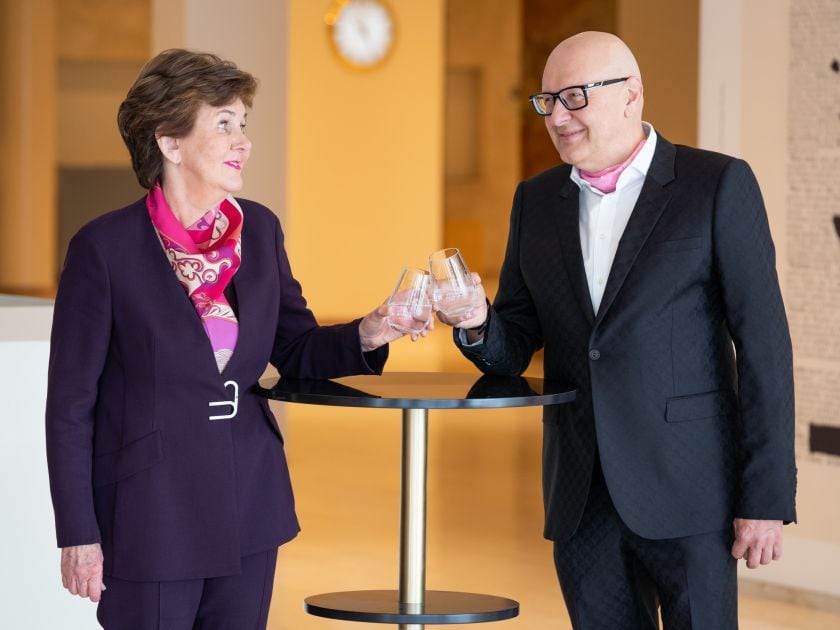
BWT is the new Global sponsor of the Salzburg Festival.
Helga Rabl-Stadler, President of the Salzburg Festival, and Andreas Weissenbacher, BWT’s founder, announced the signing of the contract at the press conference in Salzburg on 22 March 2021. The cooperation agreement has been signed for an initial five years, running through 2026.
“Sustainability is the order of the day. We are particularly pleased that the Festival has managed to find an additional Global sponsor in BWT – Best Water Technology – who will support us in striving towards this goal. The idea of banning single-use bottles from our lives shall conquer the world from Salzburg,” said Festival President Helga Rabl-Stadler.
“As long as we don’t have the choice of emigrating to another planet, we should take care of the one we have. Plastic waste, single-use bottles and their worldwide transport must be reduced drastically. Towards this end, we implement Plastic Bottle Free Zones. I am glad that this vision has now arrived in the cultural sector, as this partnership with the Salzburg Festival demonstrates, and that it will reach the world from this platform,” said Andreas Weissenbacher, founder of BWT.
On the occasion of World Water Day, which takes place on 22 March every year, Andreas Weissenbacher and Helga Rabl-Stadler discussed the future of the valuable resource of water during a press conversation. What are the most pressing future challenges with regard to water and water treatment; how can BWT contribute to sustainable development on our planet; how can plastic be avoided in the future, and how can water sources be made accessible for everyone in other countries?
About BWT
Change the world – sip by sip
BWT Best Water Technology – a Company with a Sustainable Mission
When Andreas Weissenbacher bought the water technology branch of the company Benckiser 31 years ago, in 1990, as part of a management buyout, he did so with a clear vision: to develop the company into the internationally leading water technology group. Benckiser Water Technology turned into BWT – Best Water Technology, and this acronym has described the mission to this day: to deliver best performance day by day, ensuring the greatest possible safety, hygiene, health and wellbeing in daily contact with water through economical and ecological water treatment technologies. Today the Best Water Technology group is Europe’s leading water technology company. Approximately 5,000 staff work to provide customers in private households, industry, manufacturing, hotels and municipalities with modern and sustainable treatment systems and services for potable water, pharmaceutical and process water, heating water, boiler, cooling and air-conditioning water as well as swimming pool water – delivering optimum quality for all areas, from source to seepage. BWT employees have always focused on new processes and materials, using the latest methods in research and development to develop ecological and economical products. One important aspect is the reduction of resource and energy use of its products, thereby also reducing CO2 emissions. This mission of saving our planet’s resources through sustainable products is more topical and current than ever, considering the challenges our society faces around the world today.
From Plastic Planet to Planet Blue – Change the World sip by sip
Earth’s population is growing rapidly – as early as 2050, more than 10 billion people will inhabit our planet. Demand for hygienic, clean drinking water will rise by 55 percent by that point, but even today, more than 800 million people lack access to clean, healthy and pure water. In parallel, the worldwide transport of goods and products will rise by 350 percent during the coming 30 years – meaning the volume of transport will be 4.5 times what it is today.
For instance, one million plastic bottles are manufactured every minute worldwide, which are then transported around the globe, creating unnecessary CO2 emissions as well as tons of plastic waste. We all live on a “plastic planet”. The flood of plastics increases continuously, and so-called microplastic can be found everywhere – in the air, in the soil, in our food, in water, and it has also been found inside our bodies. This is an enormous problem for humans and the planet: to counteract this problem is BWT’s mission and goal.
BWT Bottle Free Zones – Use local Water – avoid single-use plastic bottles
BWT’s declared goal is to provide water of perfect potable quality everywhere in the world. Innovative, patented BWT technologies make it possible to filter local water while also enriching it with valuable minerals and trace elements such as magnesium, zinc and silica. Thanks to BWT, tasteful, mineralized water is delivered directly from the tap, watercooler or tabletop water filter. This saves elaborate transportation, storage and disposal of water bottles. BWT focuses particularly on sustainability, social responsibility and the preservation of limited resources, ensuring that future generations can enjoy a beautiful, habitable world. The philosophy of the Bottle Free Zone brings us closer to this goal every day, sip by sip. However, a Bottle Free Zone does not mean it does not contain any bottles. Rather, the idea is to avoid single-use plastic bottles which cause vast quantities of waste. Inside a Bottle Free Zone, reusable bottles made of glass or synthetic materials or thermos bottles are used which are free of BPA and materials that are harmful to the environment. Whether at home, at the office, in the gastronomic and hospitality sector or in public buildings: inside a BWT Bottle Free Zone, locally treated, mineralized water is bottled in environment-friendly reusable bottles, having been enriched with valuable magnesium, zinc and silica.
Every sip helps another person drink
BWT has always considered it part of its mission to help people suffering existential need, supporting projects which are proven to contribute to sustainable development in regions affected by poverty. As part of the b.waterMISSION project, BWT will help build a total of 10,000 wells in the Gambia, Tanzania and environs over the coming 7 to 10 years, enabling locals to source clean drinking water. Thus, Bottle Free Zones not only stand for optimum-quality water, but they really change the world – sip by sip.
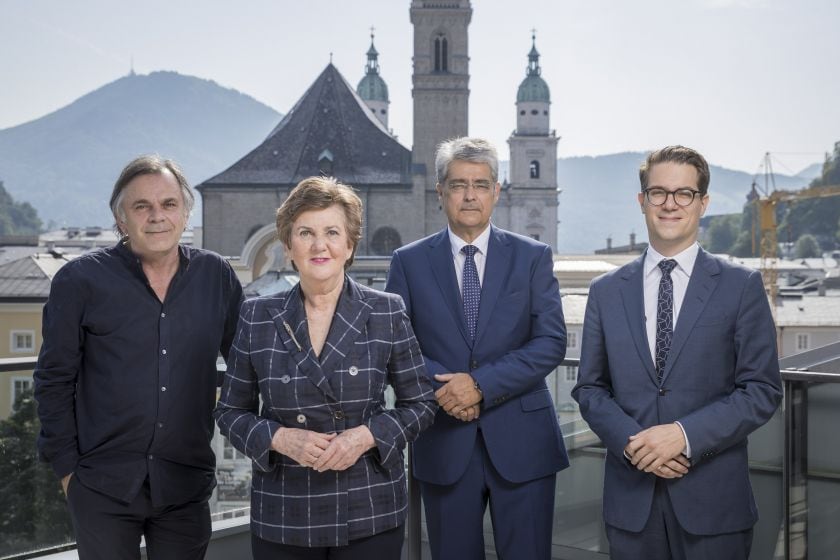
Siemens Remains Main Sponsor of the Salzburg Festival through 2026.
(SF, 26 July 2021) For at least three years, with an option for two more, Siemens will remain a main sponsor of the Salzburg Festival, i.e. through 2026. The corporation was a project sponsor from 1995 to 1998 and has been a main sponsor since 1999. Support from Siemens enables the Salzburg Festival to offer free access to performances to an extent unique throughout the world. The Siemens Festival>Nights have been the world’s largest public screening of classical music since 2002, celebrating their 20th anniversary this year. Approximately one million people have already experienced these broadcasts of historical and current Festival performances on Kapitelplatz free of charge. A wonderful ambiance and a fascinating programme make the Siemens Festival>Nights an annual fixture of the Salzburg Festival summer.
“Sponsors like Siemens guarantee the diversity of the Salzburg Festival’s programming. Especially in economically uncertain times such as these, this new contract gives us financial stability, and the Siemens Festival>Nights are a gift to opera lovers from around the world,” Festival President Helga Rabl-Stadler expressed her gratitude on behalf of the Directorate.
After registering for specific seats, visitors can attend the public screenings free of charge between 24 July and 29 August 2021. This year, a novelty awaits, the Siemens Breakfast>Concert: every Saturday at 10 am, selected concerts of the Salzburg Festival will be shown and can be accompanied by breakfast at the restaurant tent. Children and teenagers have the possibility of experiencing a colourful mix of child-appropriate operas and ballets during the Siemens Children’s>Festival. The Siemens Festival>Nights are presented by the Salzburg Festival, Siemens Austria, UNITEL and ORF Salzburg.
Four productions from the current Festival programme will be shown:
– The Vienna Philharmonic under Andris Nelsons on 14 August, 10 am
– Don Giovanni on 15 August, 8 pm
– The Vienna Philharmonic under Christian Thielemann on 21 August, 10 am
– musicAeterna 1 under Teodor Currentzis, 28 August, 10 am
The broadcast series begins on 24 July with Hannes Rossacher’s film Jedermann Remixed, a performance of Hofmannsthal’s classic which never took place in this form: splicing various recordings from several decades, the result resembles a jigsaw of cultural history, with protagonists ranging from Alexander Moissi to Nicholas Ofczarek. Jedermann will also be featured on four further evenings, specifically the 1983, 2004, 2013 and 2020 productions.
The programme offers something for every imaginable taste: for example, there is Richard Strauss` Elektra from the past Festival summer, Salome (2018), L’Italiana in Algeri (2018), Orphée aux enfers by Jacques Offenbach and Verdi’s Aida of 2017.
Wolfgang Amadeus Mozart‘s Die Zauberflöte will be shown in three different productions – from 2018, 1997 and 1991.
Festival history is revived with Karajan’s production of Bizet’s Carmen of 1967.
The Siemens Festival>Nights end on 29 August with an Anna Netrebko special, when the audience may vote for its favourite among five opera productions.
Due to current regulations, admission is only possible with assigned seating. Seats can now be booked via www.siemens.at/festspielnaechte or www.tickets.orf.at. The “3G rule” applies for admission to the Festival>Nights. Facemasks must be worn during admission until the screening begins and after until you have left the premises.
Further information on the safety measures can be found here: www.siemens.at/festspielnaechte/en/covid-19-massnahmen
Contact Information
Tel. +43 662 8045 – 408
j.mueller@salzburgfestival.at
Tel. +43 662 8045 – 8147
d.haider@salzburgfestival.at
Tel. +43 662 8045 – 491
m.daglinger@salzburgfestival.at
Tel. +43 662 8045 – 516
m.fieg@salzburgfestival.at
Tel. +43 662 8045 – 490
c.holzer@salzburgfestival.at

